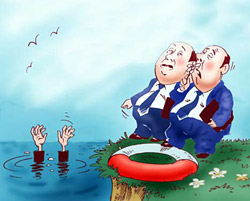The International Monetary Foundation (IMF) has made a very interesting recommendation in its report on Armenia called “Growth and poverty reduction in Armenia”. IMF recommends the Armenian government to remove its two separate taxation bodies (State Taxation services (STS) and Customs Committee (CC)) and have the Ministry of Economy control the two.
According to IMF, the reason is the fact that the two work differently. These two bodies are separate institutions, their heads are appointed by the president but are held accountable to the prime minister. “Both of these bodies have their “targets” for collecting taxes and they are in competition. As a result of this competition, these bodies tend to collect maximal taxes during short periods and the taxation services check-up on companies more than they should. Whereas this used to regulate taxes going to the budget before, now the government should create a new taxation regime, which will be based on self-evaluation of tax-payers, check-up based on risk and improved exchange of information”, as stated in the report. According to their information, the share of tax flows in the GDP of Armenia is the lowest out of the CIS countries and covers 14,3%. In a word, with this report the IMF shows that the taxation field of Armenia has many flaws and it recommends joining the two.
In regard to this, the deputy head of STS, Armen Alaverdyan says that the reason for this difference is the fact that during the past couple of years, the GDP of Armenia is growing at a rapid pace and its growth mark consists of two figures. In spite of this, tax collection rates should grow in parallel to the GDP growth. According to A. Alaverdyan, the state budget is planned by taking this into consideration. Armen Alaverdyan says that the reason that the share of tax collection is so low in GDP is the fact that social payments and local budget collections is tax collection, but are not calculated. Besides that, taxes are not levied on farmers involved in agriculture, which covers 25-30% of the GDP. Moreover, he says that there are foreign organizations that implement programs here and are not taxed. “These factors make a difference durng this development phase. I think that it has nothing to do with the fact that not many taxes are levied. We will tax the other fields too in the years to come. For instance, we are planning to tax agriculture starting from 2009”, says A. Alaverdyan.
As for the recommendation of IMF, A. Alaverdyan says that it is not justified, “Our experience shows that both the STS and CC have fulfilled their responsibilities on time and rather well. So, whoever tries to found a new organization during this transitional period needs to explain the reasons why. What is the purpose? What do they expect? Armenia made an attempt in 1990. I think we should discuss our expectations and needs and then make a choice”, says A. Alaverdyan.
They should note that when making this decision and this choice neither the IMF nor the Armenian government will take into consideration what the STS and CC officials say or think. At the beginning of this year the president gave instructions to the heads of these two bodies. Besides that, now the IMF makes recommendations too. Why did they dissolve the ministry of state incomes? The reason was because the Armenian government wanted to do what the IMF told it to do in order to start a competition between the two bodies. They thought that if they be separate, these bodies would compete to tax more. This is what they are doing now. We think that instead of registering good marks, it would be better for the IMF to first pay atention to where a big share fo the taxes goes. This is very important for Armenian economy.
Why should the taxation bodies busy collecting taxes join the ministry of finances, which is busy spending the money? Can one body carry out two different functions? What’s behind this recommendation? Only the IMF can answer this question. As for the Armenian authorities, the only thing they should do now is understand what this recommendation means.

